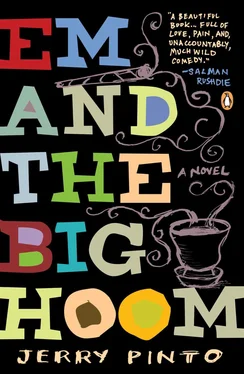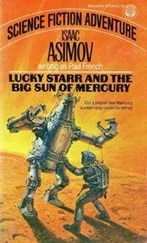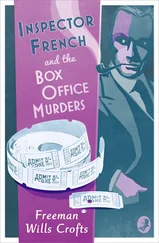Jerry Pinto - Em and the Big Hoom
Здесь есть возможность читать онлайн «Jerry Pinto - Em and the Big Hoom» весь текст электронной книги совершенно бесплатно (целиком полную версию без сокращений). В некоторых случаях можно слушать аудио, скачать через торрент в формате fb2 и присутствует краткое содержание. Год выпуска: 2014, Издательство: Penguin Books, Жанр: Современная проза, на английском языке. Описание произведения, (предисловие) а так же отзывы посетителей доступны на портале библиотеки ЛибКат.
- Название:Em and the Big Hoom
- Автор:
- Издательство:Penguin Books
- Жанр:
- Год:2014
- ISBN:нет данных
- Рейтинг книги:3 / 5. Голосов: 1
-
Избранное:Добавить в избранное
- Отзывы:
-
Ваша оценка:
- 60
- 1
- 2
- 3
- 4
- 5
Em and the Big Hoom: краткое содержание, описание и аннотация
Предлагаем к чтению аннотацию, описание, краткое содержание или предисловие (зависит от того, что написал сам автор книги «Em and the Big Hoom»). Если вы не нашли необходимую информацию о книге — напишите в комментариях, мы постараемся отыскать её.
Em and the Big Hoom — читать онлайн бесплатно полную книгу (весь текст) целиком
Ниже представлен текст книги, разбитый по страницам. Система сохранения места последней прочитанной страницы, позволяет с удобством читать онлайн бесплатно книгу «Em and the Big Hoom», без необходимости каждый раз заново искать на чём Вы остановились. Поставьте закладку, и сможете в любой момент перейти на страницу, на которой закончили чтение.
Интервал:
Закладка:
‘She took one look at me,’ The Big Hoom said, ‘and said, “Who is this?” Mario said, “He’s Augustine. He’s from Goa.” “Okay, nice to meet you,” she said and took her son and left.’
‘Didn’t Mario tell her that he had invited you?’
‘He turned around as if to say something, I think. Maybe he even said “Sorry aahn?” or something like that. I don’t think he ever told his mother that he had invited me to Bombay to stay with them.’
‘What did you do?’
Suddenly on that warm Goa afternoon, I felt the cold horror of that moment reach me across the years. The Big Hoom had been about as old as I was. I would not have known what to do. I would probably have burst into tears or gone running after Mario and his mother.
‘I stood there for a while. I didn’t know what to do. I had very little money left. And then a car stopped in front of the station and a lady got out and said, “Take out those bags.” I thought she wanted some help so I got the bags out but when I had carried them into the station, she gave me two pice.’
‘Two pice?’
‘A grand sum,’ said The Big Hoom. ‘My first earnings ever. I spent them immediately on tea and an omelette at the railway canteen.’
‘So you became a coolie?’
‘Who knows what would have happened if I had become a coolie?’ The Big Hoom asked reflectively and I promised myself that I would stop my silliness by simply not saying anything more. ‘It’s like that Maugham story of the illiterate sacristan who gets the sack and becomes a millionaire because he goes into business for himself. A journalist comes to interview him and asks him something like, “You achieved all this and you were illiterate. What would have happened if you were literate?” And the millionaire replies, “I would have been a sacristan.”’
Railway coolies were a closed shop.
‘You couldn’t just pick up a bag and earn a couple of pice. You had to belong to the fraternity. And to belong to the fraternity, you had to speak Marathi and know someone who already belonged. I could only speak Konkani and Portuguese and English and I knew no coolies. So I was warned and kicked out of the station and went back to get my luggage.’
‘Oh God.’
Of course. He would have had to put down his own bags to carry the woman’s bags…
‘The bags were gone. But someone said that they had been handed over to the stationmaster as lost luggage.’
Finally, a stroke of luck. The stationmaster was Goan.
‘He made me wait outside his office. He said he would put me on the bus the next day. He took me to the Moira coor and bought me dinner. They found a bed for me. In the evening, the men and boys came back. I didn’t know any of them but they took me to Cross Maidan and we played football. They bought me dinner too. The cleaners gave me some breakfast and in return, I had to help wash the floor. That was okay. I didn’t mind work. At around five, an old man came into the dorm and said, “Where’s Pedru?” No one knew where Pedru was. One of the cleaners said, “Patraõ, you know what Pedru’s problem is.” “Fallen down drunk again?” said the old man, ignoring the fact that he was reeking of alcohol himself. “Such a pity.” Then he saw me and said, “You, what’s your name?” I told him. “Got a job?” I told him I didn’t have one. He switched to Portuguese. “Do you speak Portuguese?” he asked. “I speak it fairly well,” I said. “Do you speak English?” he asked. “I speak it well,” I said. He switched to Konkani. I could speak that too. Then he switched to Hindi and Marathi and Gujarati but I just kept shrugging. I didn’t even know a few words in any of those languages. I thought: “Gone, now I won’t get the job.” But finally, he shrugged and said, “You’ll pick them up, I suppose. Come on, then.”
‘So I went with Dr da Gama Rosa to his clinic. It was the first time I had ever sat in a car. And when I told him that he laughed and said it was the first of many firsts.’
‘What did he want you to do?’
‘Oh, didn’t I tell you? He was a doctor and he needed a compounder.’
‘You were a compounder?’ I asked.
‘Why not?’
I knew what a compounder was. He was the guy who shelled out the pills, wrapping up your morning, afternoon and evening doses separately, pouring a bit of red syrup into a bottle and adding a bit of pink syrup that tasted of mint. Then the bottle itself would have a label stuck on it and the dose marked on the obverse with a strip of paper. The compounders I knew were all ghostly presences. George, the one who reigned in our family doctor’s clinic, was a man whose face I would always remember foreshortened, framed in the circular aperture through which he passed pudias of pills and bottles of syrup. Through the years that we knew him, he said very little. ‘Three times a day after meals,’ he might say. ‘Come back in three days.’ Or, ‘The white ones are to be stopped if the fever goes.’
Another element of my father’s ability to handle the universe fell into place. He had an almost benevolent contempt for Dr Saha, the family physician. When we were ill, we went to The Big Hoom and he told us what was wrong. Most often he would say, ‘Go and lie down and only get up to go to the toilet.’ He believed in rest, lots of fresh fruits and vegetables and boiled water as a cure for almost everything. If he thought we needed pharmaceutical help, he’d take us down to Dr Saha and try very hard not to dictate the prescription.
Em, on the other hand, needed reassurance that we were not about to die.
‘When Susan was a baby,’ she told me once, ‘she had diarrhoea. She seemed to be doing nothing but shitting. And green shit too. So I covered the floor with a plastic sheet and I spread out all her soiled nappies for Dr Saha to look at.’
‘What did he say?’ I asked, as the image began to blossom in my head and the sheet grew and more and more diapers began to festoon the room and the smell began to grow, putrid and pungent.
‘He gave me that classic look,’ she said. It was a classic Em remark. Its origin lay in some advertisement, perhaps for men’s clothing.
This was one of my ways of dividing up the world. My mother: incapable. My father: capable. My mother’s mind belonged to the humanities. My father was the engineer. I was so used to talking about my father as an engineer, I was a little startled to think of him as a compounder. I had no idea I took any pride in his calling. I liked to think I would have been proud of him as a street sweeper but that, I knew, somewhat uncomfortably, was so hypothetical as to be impossible to imagine. And now the thought of him as a compounder had me thinking.
‘What happened to Pedru?’
‘He came back once, very drunk. The doctor sent him away. “Both of us can’t be drunk, Pedru,” he said.’
‘The doctor was an alcoholic?’ I asked.
‘Yes,’ said The Big Hoom. ‘He was drunk almost all the time. There was nothing much to do since hardly anyone would come to him and so he drank more. There were a few patients who still believed in him, but most of the others wanted a man who didn’t smell so strongly of alcohol at ten in the morning. But that was a pity because he was a great doctor. He listened. He took notes. He made out careful case histories. He kept records. He made house calls. He kept secrets. He never prescribed because a medical representative had promised him an incentive or had given him a wall clock. He had some raisins in his desk drawer for children. He washed his hands after every patient. And he would not laugh at Ayurveda or Unani or homoeopathy. “Sometimes, they get in the way less than we do,” he would say.’
This made me slightly uncomfortable. I had discovered The Big Hoom’s hero. I did not want my hero to have a hero.
Читать дальшеИнтервал:
Закладка:
Похожие книги на «Em and the Big Hoom»
Представляем Вашему вниманию похожие книги на «Em and the Big Hoom» списком для выбора. Мы отобрали схожую по названию и смыслу литературу в надежде предоставить читателям больше вариантов отыскать новые, интересные, ещё непрочитанные произведения.
Обсуждение, отзывы о книге «Em and the Big Hoom» и просто собственные мнения читателей. Оставьте ваши комментарии, напишите, что Вы думаете о произведении, его смысле или главных героях. Укажите что конкретно понравилось, а что нет, и почему Вы так считаете.











